
Vocational education is education that prepares people for a skilled craft as an artisan, trade as a tradesperson, or work as a technician. Vocational education can also be seen as that type of education given to an individual to prepare that individual to be gainfully employed or self employed with requisite skill. Vocational education is known by a variety of names, depending on the country concerned, including career and technical education, or acronyms such as TVET and TAFE.
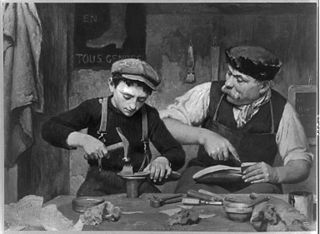
Apprenticeship is a system for training a new generation of practitioners of a trade or profession with on-the-job training and often some accompanying study. Apprenticeships can also enable practitioners to gain a license to practice in a regulated occupation. Most of their training is done while working for an employer who helps the apprentices learn their trade or profession, in exchange for their continued labor for an agreed period after they have achieved measurable competencies.
A Bachelor of Education is an undergraduate academic degree which prepares students for work as a teacher in schools. A Bachelor of Education program typically lasts three to four years and combines both coursework and practical experience in educational settings. The curriculum is designed to provide foundational knowledge in pedagogy, educational psychology, teaching methodologies, and subject-specific training. Graduates of this program are equipped with the skills necessary to foster a supportive and effective learning environment for their students.
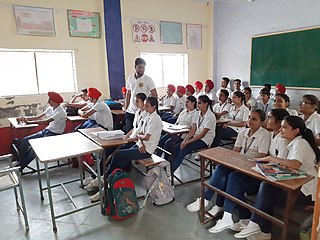
Education in India is primarily managed by the state-run public education system, which falls under the command of the government at three levels: central, state and local. Under various articles of the Indian Constitution and the Right of Children to Free and Compulsory Education Act, 2009, free and compulsory education is provided as a fundamental right to children aged 6 to 14. The approximate ratio of the total number of public schools to private schools in India is 10:3.
Education in England is overseen by the Department for Education. Local government authorities are responsible for implementing policy for public education and state-funded schools at a local level. State-funded schools may be selective grammar schools or non-selective comprehensive schools. All state schools are subject to assessment and inspection by the government department Ofsted. England also has private schools and home education; legally, parents may choose to educate their children by any suitable means.
IEK is a Greek abbreviation name for the Ινστιτούτο Επαγγελματικής Κατάρτισης.
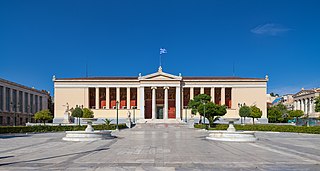
Education in Greece is centralized and governed by the Ministry of Education and Religious Affairs at all grade levels in elementary and middle school. The Ministry exercises control over public schools, formulates and implements legislation, administers the budget, coordinates national level university entrance examinations, sets up the national curriculum, appoints public school teaching staff, and coordinates other services.
Higher education in Mauritius includes colleges, universities and other technical institutions. Public university education has been free to students since 2019. The sector is managed by the Higher Education Commission (HEC) which has the responsibility for allocating public funds, and fostering, planning and coordinating the development of post-secondary education and training. Formerly the Tertiary Education Commission, in 2020 it was reformed into the HEC and a separate Quality Assurance Authority (QAA) for auditing of qualifications.
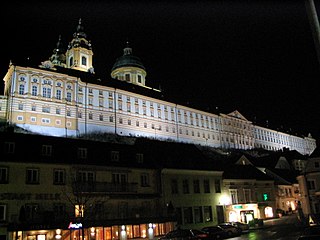
The Republic of Austria has a free and public school system, and nine years of education are mandatory. Schools offer a series of vocational-technical and university preparatory tracks involving one to four additional years of education beyond the minimum mandatory level. The legal basis for primary and secondary education in Austria is the School Act of 1962. The Federal Ministry of Education is responsible for funding and supervising primary, secondary, and, since 2000, also tertiary education. Primary and secondary education is administered on the state level by the authorities of the respective states.

Education in Botswana is provided by public schools and private schools. Education in Botswana is governed by the Ministries of Basic Education. and Tertiary, Research Science and Technology Among sub-Saharan African countries, Botswana has one of the highest literacy rates. According to The World Factbook - Central Intelligence Agency as of 2015, 88.5% of the population age 15 and over can read and write in Botswana were respectively literate.
A national qualifications framework (NQF) is a formal system describing qualifications. 47 countries participating in the Bologna Process are committed to producing a national qualifications framework. Other countries not part of this process also have national qualifications frameworks.
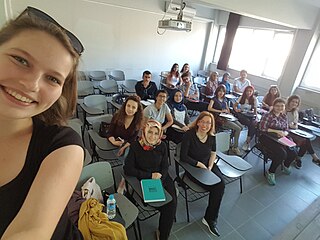
Education in Turkey is governed by a national system which was established in accordance with the Atatürk's Reforms. It is a state-supervised system designed to produce a skillful professional class for the social and economic institutes of the nation.
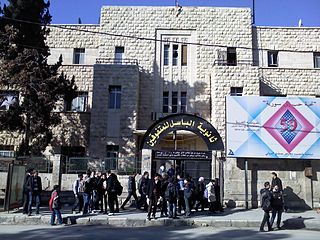
Education in the Syrian Arab Republic is given the necessary attention and care by the Syrian state, as the Constitution of Syria guarantees the right to education to every citizen, which is compulsory and free at primary level. It is free but not compulsory at the secondary level and higher education is available for a symbolic fee. the primary level includes 3 stages, 1 which include grades 1 to 6, while 2 includes grades 7 to 9,and lastly 3 grades 10 to 12

Education in Mauritius is managed by the Ministry of Education & Human Resources, which controls the development and administration of state schools funded by government, but also has an advisory and supervisory role in respect of private schools. The Tertiary education is maintained by the Ministry of Tertiary Education, Science, Research and Technology. The government of Mauritius provides free education to its citizens from pre-primary to tertiary levels. Since July 2005, the government also introduced free transport for all students. Schooling is compulsory up to the age of 16. Mauritian students consistently rank top in the world each year for the Cambridge International O Level, International A and AS level examinations. Among sub-Saharan African countries, Mauritius has one of the highest literacy rates. The adult literacy rate was at 91.9% in 2022. According to the 2022 census, the proportion of people with higher education has increased to 8.8%. Mauritius was ranked 57th in the Global Innovation Index in 2023, 1st in Africa.

Before the arrival of European settlers, who introduced a formal education system addressed to the elites, education in Ghana was mainly informal and based on apprenticeship. Economic activities in pre-colonial Ghana were based on farm produce shared within households and members of each household specialized in providing necessities such as cooking utilities, shelter, clothing, and furniture, and trade with other households was therefore practiced on a very small scale. As such there was no need for employment outside the household that would have otherwise called for disciplines, values, and skills through a formal education system. After colonization, Ghana's economy became a hybrid of subsistence and formal economy.
Education in Lebanon is regulated by the Ministry of Education and Higher Education (MEHE). In Lebanon, the main three languages, English and/or French with Arabic are taught from early years in schools. English or French are the mandatory media of instruction for mathematics and sciences for all schools. Education is compulsory from age 3 to 14.

Education in Western Australia consists of public and private schools in the state of Western Australia, including public and private universities and TAFE colleges. Public school education is supervised by the Department of Education, which forms part of the Government of Western Australia. The School Curriculum and Standards Authority is an independent statutory authority responsible for developing a curriculum and associated standards in all schools, and for ensuring standards of student achievement, and for the assessment and certification according to those standards.

Education in Azerbaijan is regulated by the Ministry of Education of Azerbaijan.
TVE refers to all forms and levels of education and which provide knowledge and skills related to occupations in various sectors of economic and social life through formal, non-formal and informal learning methods in both school-based and work-based learning contexts.To achieve its aims and purposes, TVE focuses on the learning and mastery of specialized techniques and the scientific principles underlying those techniques, as well as general knowledge, skills and values.
Post-secondary qualifications are qualifications typically studied for after successful completion of secondary school. In Sri Lanka, this is usually after successful completion of the General Certificate of Education. A variety of different post-secondary qualifications are offered in Sri Lanka.













